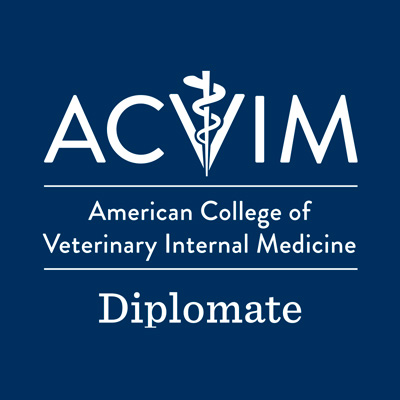Dr. Sarah Cocker
Diplomate, American College of Veterinary Internal Medicine (SAIM)
Dr. Sarah Cocker is a board-certified small animal internal medicine specialist in California. She is based out of San Diego, CA, and is available to serve general practice and emergency animal hospitals throughout the greater San Diego metro area.
Biography
Dr. Sarah Cocker received her Doctorate of Veterinary Medicine from Oklahoma State University in 2011. She completed a small animal rotating internship in Austin, Texas from 2011 – 2012 and a specialty internship in internal medicine and critical care in Houston, Texas from 2012 – 2013 before starting her internal medicine residency in San Diego. She successfully completed her Internal Medicine residency training in July 2016 and continued to practice at VSH until joining Moves in 2023.
Dr. Cocker enjoys many aspects of internal medicine, but has special interests in gastrointestinal and hepatobiliary diseases. She wrote one of the hepatobiliary chapters in Ettinger’s Textbook of Veterinary Internal Medicine and is a member of the Comparative Gastroenterology Society. In her free time, Dr. Cocker enjoys traveling and spending time with her husband, child, and fur babies.
CV
- 2023
Joined MOVES - 2020
Achieved board certification through ACVIM - 2016
Completed small animal internal medicine residency at Veterinary Specialty Hospital by Ethos (San Diego, CA) - 2013
Completed small animal internal medicine and critical care internship at Gulf Coast Veterinary Specialists (Houston, TX) - 2012
Completed small animal rotating internship at Central Texas Veterinary Specialty Hospital (Austin, TX) - 2011
Earned DVM degree from Oklahoma State University - 2007
Graduated from Oklahoma State University with a B.S. in Biochemistry and Molecular Biology
Cocker SE and Richter K: History, Clinical Signs, and Physical Findings in Hepatobiliary Disease. In Ettinger SJ, Feldman ED, editors; Textbook of Veterinary Internal Medicine: Diseases of the Dog and Cat. 8th edition 2017.
Cocker SE, Lawrence YA, Lidbury JA, Suchodolski JS, Steiner JM, Richter KP. Evaluation of canine pancreatic lipase immunoreactivity in dogs chronically administered glucocorticoids. Vet Clin Pathol. 2022 Feb; 50 Suppl 1:63-69. E pub 2021 Jul 19
Chow B, Hill SL, Richter KP, Marsilio S, Ackermann MR, Lidbury JA, Suchodolski JS, Cocker SE, Steiner JM. Comprehensive comparison of upper and lower endoscopic small intestinal biopsy in cats with chronic enteropathy. J Vet Intern Med. 2021 Jan; 35(1):190-198. Epub 2020 Dec 21.
Cocker SE and Theisen SK. Refractory Seizures in a Dog. Clinician’s Brief 2012; 10(5):71-73.
Send a Message to Dr. Cocker
What is a board-certified veterinary internal medicine specialist?
A veterinary internal medicine specialist is a veterinarian who has completed advanced training in internal medicine (including a one-year internship and three-year residency) following graduation from their veterinary college. The residency training culminates with a comprehensive examination covering all aspects of veterinary small animal internal medicine. Once these requirements have been fulfilled, the veterinarian is considered to be a Diplomate of the American College of Veterinary Internal Medicine (ACVIM).
The umbrella of small animal internal medicine includes many sub disciplines including gastroenterology (esophageal, stomach and intestinal disease), hepatology (liver and pancreatic disease), endocrinology (hormonal disease), infectious diseases, urology (urinary tract disease), nephrology (kidney disease), respiratory medicine (nose, airway and lung disease), and hematology & immunology (blood cell and immune-disease). In many cases, the signs of a patient may include many of these organ systems. Due to their holistic approach, internal medicine specialists may also manage cases of patients with neurologic, cardiovascular or cancerous diseases, especially when these patients also share diseases within the scope of internal medicine.
Adapted from “What is a Board-Certified Veterinary Internal Medicine Specialist?” on vetspecialists.com.




